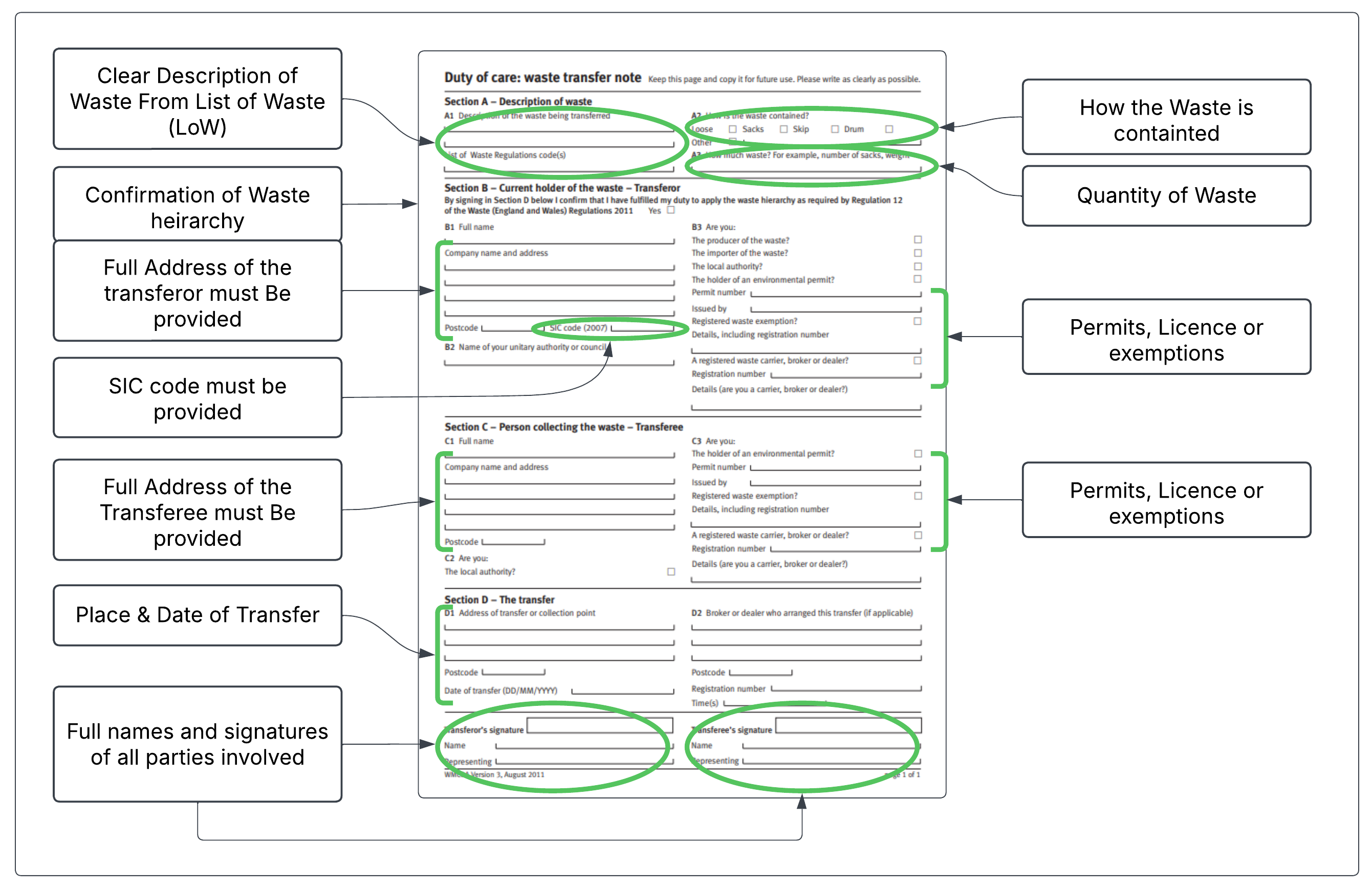Waste management is a critical aspect of environmental responsibility, and businesses generating waste must adhere to legal requirements. One essential document in this process is the Waste Transfer Note (WTN). In this guide, we’ll explain what a WTN is, why it is necessary, and how to ensure compliance.
What is a Waste Transfer Note?
A Waste Transfer Note (WTN) is a legally required document that records the transfer of waste from one party to another. It is used to track the movement of waste within the UK and ensures that waste is handled, transported, and disposed of correctly.
They should always include the following information:
- Waste Description.
- List of Waste (LoW) Regulations Code.
- How the waste is contained.
- Quantity of Waste.
- Waste Producer’s Details.
- SIC Code.
- Waste Transferor’s Details.
- Waste Carrier’s Licence Number.
- Details, including permit, licence or exemption.
- The place and date of transfer.
- Confirmation that the Waste Hierarchy has been applied.
WTNs are a key part of the Duty of Care regulations under the Environmental Protection Act 1990, which aim to prevent illegal waste disposal and promote responsible waste management practices.
Example Waste Transfer Note

Who Needs To Complete a Waste Transfer Note?
- Waste Producers: Those who generate waste must complete a WTN when handing waste over to a carrier, ensuring it is properly documented
- Waste Carriers: Waste Carriers, who transport waste, must complete the WTN to confirm they’re authorised and will handle the waste responsibly.
- Waste Receivers: Those receiving the waste (such as disposal or recycling sites) must complete a WTN to confirm they’ll dispose of it correctly and are permitted to accept the material.
- Brokers or Dealers: Brokers or dealers facilitating waste transfer must also complete the WTN to ensure proper handling and compliance with regulations
Why Do We Need Waste Transfer Notes?
WTNs play a crucial role in maintaining a transparent and accountable waste management system. Here’s why they are important:
- Legal Compliance: Businesses must maintain a WTN for each waste transfer to comply with the law. Failure to do so can result in fines and legal consequences.
- Waste Duty of Care: The Environmental Protection Act 1990 outlines a Duty of Care for businesses and individuals who produce, carry, keep, treat, or dispose of waste. This duty ensures that waste is handled safely and responsibly throughout the entire disposal process.
- Who Must Apply the Duty of Care: The Duty of Care applies to anyone who produces or manages waste, including businesses, waste carriers, brokers, and waste management companies. These parties must ensure waste is transferred to authorised persons and documented correctly.
- Environmental Protection: By ensuring waste is managed responsibly, WTNs help prevent pollution, illegal dumping, and environmental damage.
- Traceability and Accountability: WTNs create an audit trail that authorities and businesses can use to verify that waste is handled correctly by licensed carriers and disposed of legally.
- Efficient Waste Management: Proper documentation helps businesses streamline their waste handling processes, making it easier to track waste disposal costs and methods.
- Avoiding Fines and Penalties: Companies that fail to comply with waste management regulations may face significant fines, and WTNs serve as proof that waste has been transferred legally and responsibly.
For more details, see the UK government’s guidance on Waste Duty of Care: Waste Duty of Care Code of Practice.
How to Ensure Your Compliance
To comply with waste transfer regulations, businesses should:
- Complete a WTN for every transfer of waste.
- Keep WTNs for at least two years and present them upon request from authorities.
- Ensure waste is only transferred to licensed carriers with the appropriate permits.
- Accurately describe the waste and follow proper disposal methods.
Conclusion
Waste Transfer Notes are essential for businesses that produce or handle waste. They provide a legal and transparent way to track waste transfers, ensuring compliance with environmental laws and promoting sustainable waste management. By understanding and correctly using WTNs, businesses can contribute to a cleaner and safer environment while avoiding legal pitfalls.
Sources:
Waste duty of care code of practice – GOV.UK
The List of Wastes (England) Regulations 2005
